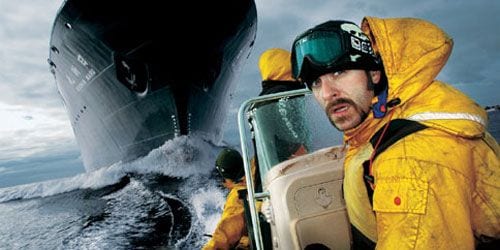
In his Harvey Milk biography The Mayor of Castro Street, Randy Shilts describes Milk’s private disappointment when the anti-gay Proposition 6 failed in California. In his mind, the initiative’s passing might have caused mass riots and increased the visibility of Milk’s cause. The initial setback could benefit them in the long run.
A similar moment occurs during the second episode of Animal Planet’s Whale Wars, which chronicles the radical Sea Shepherds’ attempts to halt the Japanese whaling industry in the Southern Ocean Whale Sanctuary. Captain Paul Watson has tasked two crew members with boarding a Japanese vessel, which may lead to disastrous consequences.
When the whalers take the two men hostage, it creates a nasty situation but also dramatically increases the media coverage. And Watson couldn’t be happier. His guys might be in trouble, but their peril is necessary for his plan’s success. The Sea Shepherds consistently blur the line between courageous activism and illegal mayhem, leading to polarizing reactions.
This seven-part series aired on Animal Planet in late 2008 and aligns the viewer with the Sea Shepherds in their battle against the whalers. Aboard the Steve Irwin, the mostly young crew uses clever tactics to disrupt the normal course of business. The crew also faces consistent setbacks throughout the journey.
In the opening “Needle in the Haystack”, the Zodiac raft flips over and sends its occupants into the deadly water. Throughout the season, they must cope with engine failure, a power outage, severe injuries, sea sickness and a few massive hangovers. It’s not an easy journey, and many bail before the mission is finished.
Watson lords over every move, choosing more daring tasks after each setback. He’s playing for much higher stakes than their individual safety or comfort. This approach leads to contentious moments but does generate impressive results.
Whale Wars is not the type of crowd-pleasing series that will inspire everyone to change their lives and go out seeking adventure. Instead, it’s a divisive production that will create as much ire as good will. The producers try to balance the perspective a bit with some background narration, but it’s clear where their hearts are. And that’s not a problem for me. Trying to show both sides completely would just dilute the message and make the experience too academic. Without a personal connection to the Sea Shepherds, their message would lose focus.
One interesting figure is Second Mate Peter Hammarstedt, a young, serious guy who’s committed to their cause. Unlike the more grizzled characters, he seems well-liked while acting as the Captain’s mouthpiece to the crew. His girlfriend Amber is also on board the ship, which probably helps to explain his calm demeanor. Hammarstedt does not appear to be a guy just looking for an adventure, a description that may fit other crew members.
On the Sea Shepherds’ website, Watson makes a clear and pivotal statement about his aims: “My clients are whales, not people.” Being criticized by governments and media outlets does not faze him. However, Watson is also a man who knows how to play the game. His choices are often made to make a point in the eyes of the world.
In “Ladies First”, he introduces a plan to have four women board a Japanese whaling ship. There’s no real tactical advantage to this choice, and it’s done entirely for PR reasons. Zodiac failures doom this venture, leading to a major injury to Shannon Mann, one of the crew’s most likable figures.
A co-founder of Greenpeace, Watson left the organization in 1977 to participate in more direct actions. The grizzled, bearded visage makes the 58-year-old an imposing figure, and his methods are serious. Even when he’s off-screen, Watson’s presence looms over each action and drives the fight against the whalers.
Unfortunately, Animal Planet has released this two-disc DVD set with zero bonus features. At a minimum, they should have included an interview with Watson and more production details. Additional background on this supercharged issue would have been worthwhile, too. Instead, there’s nothing here beyond full-color menus to distinguish this package. If anything, you’ll have the credits theme of Smashing Pumpkins’ “Bullet with Butterfly Wings” stuck in your head for a long time.
Whale Wars is tricky to dismiss because I strongly agree with the Sea Shepherds’ goal to eliminate illegal whaling. Even when their actions cross the line, it’s hard not to admire the daring crew’s bravery.
The downside is the actual production, which meanders through mundane activities and focuses too much on mechanical issues. There’s also way too much repetitive narration and obvious interviews. A better approach would have been to focus more on the personalities of some participants. Much of the personal material involves bickering, particularly with many people disliking First Mate Peter Brown.
There are some gripping moments, highlighted by the Steve Irwin‘s direct battles with the Nisshin Maru in the season finale. But the pace drags frequently in the middle episodes and offers a slow experience. Animal Planet plans to air a second installment next summer, and I’m hoping it will build on the foundation set by this controversial opening season.

![Call for Papers: All Things Reconsidered [MUSIC] May-August 2024](https://www.popmatters.com/wp-content/uploads/2024/04/all-things-reconsidered-call-music-may-2024-720x380.jpg)



